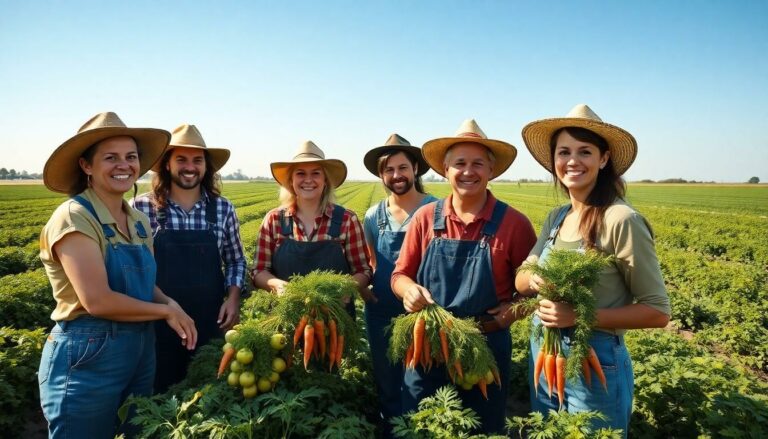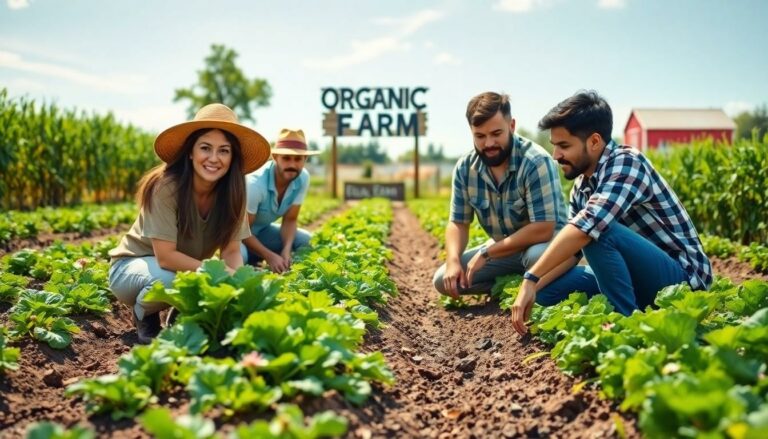Organic Farming Jobs: Discover Your Path to a Rewarding Career in Sustainability

Imagine waking up to the sound of chirping birds and the smell of fresh earth instead of the blaring alarm clock. Organic farming jobs offer not just a career but a lifestyle that connects people to nature in a way that’s both fulfilling and sustainable. It’s like being part of a secret club where the dress code is overalls and the only meetings involve planting seeds and harvesting crops.
Organic Farming Jobs
Organic farming jobs offer fulfilling opportunities for individuals passionate about sustainable agriculture. These positions involve a diverse range of tasks that connect people with nature and support environmental health.
Definition of Organic Farming
Organic farming focuses on producing food without synthetic pesticides, fertilizers, or genetically modified organisms. This practice emphasizes natural processes and biodiversity. Techniques like crop rotation, composting, and biological pest control maintain soil health and ecosystem balance. Farmers following organic principles strive to enhance the quality of food and the longevity of farming systems.
Importance of Organic Farming
Organic farming plays a crucial role in promoting environmental sustainability. It reduces pollution and conserves water by avoiding harmful chemicals. This method enhances soil health, which in turn increases biodiversity. Organic produce also offers health benefits, as it’s free from synthetic substances. Growing demand for organic products supports local economies and encourages ethical farming practices. Engaging in organic farming contributes not only to personal well-being but also to the health of the planet.
Types of Organic Farming Jobs

Organic farming jobs encompass various roles that contribute to sustainable agriculture and environmental health. Each job type offers unique experiences for individuals interested in promoting organic practices.
Field Work Positions
Field work positions involve hands-on tasks related to crop cultivation and livestock management. Workers engage in planting, harvesting, and maintaining crops. Tasks include soil preparation, weeding, and irrigation management. Laborers often operate machinery, ensuring efficiency during planting seasons. Positions like farm operators, agronomists, and organic farm assistants play crucial roles in daily operations. Individuals passionate about working outdoors thrive in these roles, as they immerse themselves in nature while supporting organic practices.
Research and Development Roles
Research and development roles focus on advancing organic farming techniques and technologies. Scientists and researchers analyze soil health, pest management, and crop genetics. Experimentation aims to improve yield while minimizing environmental impact. These professionals often collaborate with universities and agricultural organizations to study sustainable practices. Job titles in this domain include agricultural researchers, soil scientists, and biotechnologists. Individuals in these roles contribute valuable insights that help shape the future of organic farming.
Education and Advocacy Jobs
Education and advocacy jobs center on raising awareness about organic farming and its benefits. Professionals in this sector may work as educators, outreach coordinators, or policy advocates. They develop programs to teach communities about sustainable practices and engage in public speaking. Collaboration with local organizations helps promote organic farming initiatives. Job titles such as extension agents and community organizers play key roles in this field. Individuals passionate about environmental advocacy excel in these roles, influencing future generations to embrace organic methodologies.
Skills Required for Organic Farming Jobs
Organic farming jobs require a blend of technical and soft skills. These skills enhance productivity and facilitate effective collaboration within the farming community.
Technical Skills
Understanding soil health plays a crucial role in organic farming. Farmers need to know how to assess nutrient levels and amend soils appropriately. Proficiency in organic pest management ensures crops remain healthy without synthetic chemicals. Familiarity with crop rotation techniques helps maintain biodiversity and soil fertility. Additionally, knowledge of sustainable irrigation methods conserves water while maximizing yields. Experience with composting practices supports waste reduction and enhances soil quality. Workers often utilize tools and machinery specific to organic practices, so comfort with equipment is essential.
Soft Skills
Effective communication fosters teamwork in organic farming. Collaborating with peers and sharing insights contributes to success. Problem-solving abilities allow individuals to navigate challenges that may arise during cultivation. Patience proves valuable, especially when dealing with unpredictable weather and crop growth timelines. Adaptability keeps farmers responsive to changing conditions and new techniques. Passion for environmental stewardship strengthens dedication to sustainable practices. Enthusiasm for educating others about organic farming benefits community engagement and awareness. Each of these soft skills supports the mission of promoting healthier ecosystems and communities.
Benefits of Pursuing Organic Farming Jobs
Organic farming jobs offer significant benefits in multiple areas, including environmental and economic aspects.
Environmental Impact
Engaging in organic farming reduces reliance on synthetic chemicals. This method promotes biodiversity by enhancing soil health and supporting local ecosystems. Organic practices, such as crop rotation, prevent soil erosion and minimize water usage. They enhance the ability to cultivate diverse crops, contributing to sustainable agriculture. Organic farming directly combats climate change by sequestering carbon in healthy soils. Individuals involved in these jobs actively participate in nurturing the earth, fostering a deeper connection with nature. They empower communities to adopt environmentally responsible practices, creating a ripple effect for future generations.
Economic Opportunities
Individuals pursuing organic farming careers benefit from a growing market demand. The organic sector continues expanding, generating numerous job opportunities across different roles, from fieldwork to research. Many local economies thrive due to increased consumer interest in organic products. Farmers sell directly to consumers via farmers’ markets, boosting income potential and community engagement. Job seekers in this field often find competitive salaries as the industry matures. Advancements in organic farming technology also create roles focused on innovation and research. Professionals can leverage their skills in various settings, from small farms to large agricultural organizations, enhancing overall career diversity.
Challenges in Organic Farming Jobs
Organic farming jobs present unique challenges that require resilience and adaptability. Labor intensity is among the main challenges faced by workers in this field, as tasks often demand considerable physical effort. Workers frequently engage in repetitive activities such as planting and harvesting, which can lead to physical strain. Long hours under changing weather conditions require stamina and dedication.
Market competition adds another layer of complexity. Numerous organic farms vie for consumer attention, making it necessary for businesses to differentiate their products. Standards for organic certification remain stringent, ensuring that only those meeting specific criteria can claim the label. Market fluctuations can impact profitability, resulting in pressure to adapt quickly to consumer trends. Additionally, staying updated with advancements in organic practices is crucial for maintaining a competitive edge in this growing industry.
The Rewarding World of Organic Farming Jobs
Organic farming jobs offer a unique opportunity to connect with nature while contributing to environmental health. The diverse roles available cater to various skills and interests, making it accessible for many individuals passionate about sustainability. As the demand for organic products continues to grow, so do the opportunities within this field.
Engaging in organic farming not only supports personal fulfillment but also plays a crucial role in fostering healthier ecosystems and communities. Despite the challenges that come with the territory, the rewards of working in organic farming are significant. Those who choose this path can take pride in knowing they are part of a movement that prioritizes both the planet and local economies.



